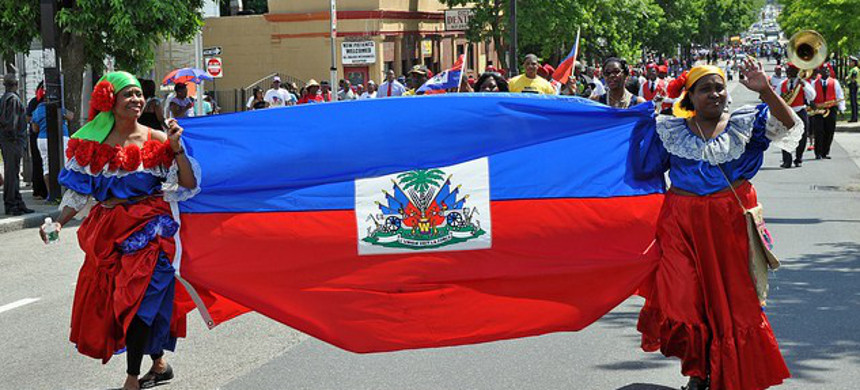Haiti, First Black Republic, Gained Independence 215 Years Ago
LATIN AMERICA AND THE CARIBBEAN, 7 Jan 2019
teleSUR – TRANSCEND Media Service
Haiti celebrates 215 years of independence amid political instability and economic crisis.

Haitians protest corruption in September 2018. “Emboldened diabolical corruption in public institutions,” the sign reads. | Photo: Efe
1 Jan 2019 – Haiti, the first Latin American country to declare independence and the first Black republic, celebrates 215 years since it forced France to surrender its colonial claim over what the slave-driven plantation formerly known as Saint-Domingue.
The Secretary-General of the Caribbean Community (Caricom), Irwin LaRocque, congratulated Haiti Tuesday, highlighting its resilience, courage, and determination.
After the French Revolution (1789 – 1799), over half a million enslaved Black men demanded the abolition of slavery in the former colony. France refused, leading to an armed uprising against the “masters.” Between 3,000 and 5,000 white men and women were killed during the uprising.
Led by Toussaint-Louverture, who declared the abolition of slavery, former slaves fought against France between 1791 hasta 1804 when general Jean-Jaques Dessalines finally defeated French forces and declared independence, reviving the island’s native name: Ayiti.
On Jan. 1, 1804, the French colony of Saint-Domingue became the Republic of Haiti, after over a decade of fighting against French enslavement and colonization. It was the most successful slave rebellion in the Americas and the only revolt of its kind that led to the creation of a state.
In a message to Haiti’s President Joevenel Moise, LaRoque stressed that it is time to “remember the historic time of the Haitian Revolution and its significance of triumph over adversity in the conquest of liberty, equality, and its national destiny.”
An important memory today, when Haiti is facing an ongoing political and economic crisis, which mostly lately led to nationwide protests and strikes against corruption and dire living conditions for the many; over half of its 10 million inhabitants survive with less than US$2 a day.
Haiti’s problems have a long history.
Since its birth as a Republic, Haiti was burdened with an illegitimate debt. In exchange for lifting a naval and diplomatic blockade, France demanded that Haiti pay 150 million of gold francs in “reparations” to former French slaveholders. According to several estimates, that was 10 times the country’s yearly revenue.
Twelve French warships with 500 cannons were stationed along the coast of Haiti, threatening to re-invade and re-enslave the Haitian people. For over a century, Haiti was required to finance the debt, hampering the possibility to invest in infrastructure, social services, and industrial development.
It wasn’t until 1947 that Haiti was finally capable of paying compensation to slaveholders and human traffickers. By then, it had already suffered a 19-year-long occupation by the United States (1915 – 1934), during which racial inequalities were exacerbated.
In 2004, Haiti officially demanded France to pay back the money, stressing that it was a “grave injustice” that prevented Haiti from developing as fast as other countries.
France has so far rejected any possibility for paying back the illegitimate debt it claimed from Haiti.
_____________________________________________________
Related:
- Haiti: Thousands Lead Protest of Alleged Misuse of State Funds
- Haiti: IMF Insists on Fuel Hikes As Political Crisis Deepens
Go to Original – telesurenglish.net
DISCLAIMER: The statements, views and opinions expressed in pieces republished here are solely those of the authors and do not necessarily represent those of TMS. In accordance with title 17 U.S.C. section 107, this material is distributed without profit to those who have expressed a prior interest in receiving the included information for research and educational purposes. TMS has no affiliation whatsoever with the originator of this article nor is TMS endorsed or sponsored by the originator. “GO TO ORIGINAL” links are provided as a convenience to our readers and allow for verification of authenticity. However, as originating pages are often updated by their originating host sites, the versions posted may not match the versions our readers view when clicking the “GO TO ORIGINAL” links. This site contains copyrighted material the use of which has not always been specifically authorized by the copyright owner. We are making such material available in our efforts to advance understanding of environmental, political, human rights, economic, democracy, scientific, and social justice issues, etc. We believe this constitutes a ‘fair use’ of any such copyrighted material as provided for in section 107 of the US Copyright Law. In accordance with Title 17 U.S.C. Section 107, the material on this site is distributed without profit to those who have expressed a prior interest in receiving the included information for research and educational purposes. For more information go to: http://www.law.cornell.edu/uscode/17/107.shtml. If you wish to use copyrighted material from this site for purposes of your own that go beyond ‘fair use’, you must obtain permission from the copyright owner.
Read more
Click here to go to the current weekly digest or pick another article:
LATIN AMERICA AND THE CARIBBEAN:
